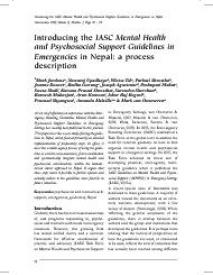Introducing the IASC Mental Health and Psychosocial Support Guidelines in Emergencies in Nepal: a process description
A rich set of reflections on experiences with the Inter Agency Standing Committee Mental Health and Psychosocial Support Guidelines in Emergency Settings has recently been published in this journal. This paper describes a case study of using the guidelines in Nepal, which focused primarily on detailed implementation of preparatory steps. In effect, it describes a multi-agency process of using the guidelines as a tool to raise awareness,foster coordination and systematically integrate mental health and psychosocial considerations within the humanitarian cluster approach in Nepal. It argues that these steps make it possible to further operate and actually adhere to the guidelines more feasible in future situations.
Geachte bezoeker,
De informatie die u nu opvraagt, kan door psychotraumanet niet aan u worden getoond. Dit kan verschillende redenen hebben,
waarvan (bescherming van het) auteursrecht de meeste voorkomende is. Wanneer het mogelijk is om u door te verwijzen naar de bron
van deze informatie, dan ziet u hier onder een link naar die plek.
Als er geen link staat, kunt u contact opnemen met de bibliotheek,
die u verder op weg kan helpen.
Met vriendelijke groet,
Het psychotraumanet-team.
In: Intervention: the international journal of mental health, psychosocial work and counselling in areas of armed conflict, ISSN 1571-8883 | 8 | 1 | 52-63
http://www.interventionjournal.com/sites/default/files/Process%20description%20IASC%20Guidelines%20Nepal%20I10.pdf


